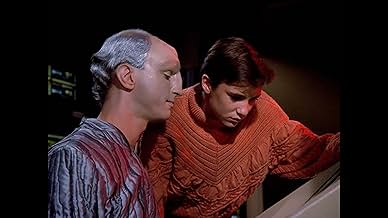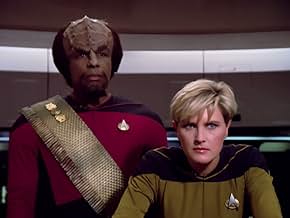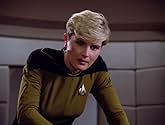Where No One Has Gone Before
- Episode aired Oct 24, 1987
- TV-PG
- 45m
IMDb RATING
7.5/10
5.1K
YOUR RATING
Everyone accurately pegs a visiting propulsion scientist as a charlatan, but only Wesley Crusher recognizes his alien assistant as the real deal.Everyone accurately pegs a visiting propulsion scientist as a charlatan, but only Wesley Crusher recognizes his alien assistant as the real deal.Everyone accurately pegs a visiting propulsion scientist as a charlatan, but only Wesley Crusher recognizes his alien assistant as the real deal.
James G. Becker
- Youngblood
- (uncredited)
Byron Berline
- Officer playing Violin
- (uncredited)
Darrell Burris
- Operations Officer
- (uncredited)
Featured reviews
Fans and critics agree that the first and second seasons of ST:TNG were not the greatest, and although one could say confidently that the first few episodes were fun, they weren't particularly noteworthy.
This all changed with episode 5, Where No One Has Gone Before. S1 harkened back to TOS with The Naked Now, and this episode as well references the second pilot of TOS - Where No Man Has Gone Before - with more than just a nod to the episode title. In the original Gary Mitchell was given the power to make thoughts a reality, and this episode includes a similar theme.
This episode is extremely important for a couple of reasons, but the primary reason is that the enormous potential for the series was shown brilliantly with this episode. During the first season TNG was attempting to find its way with with varying results. Where No One Has Gone Before was big jump in storytelling, infusing a philosophical thread into a rousing adventure more based in pure Science Fiction than Space Opera. This is an example of the kind of episode that made TOS so great, and was a solid confirmation that great things were to come from the new series.
The episode also contains one of my favorite scenes in the entire ST franchise, where Picard encounters his long deceased mother, Yvette, whom he refers to as "Maman" (pronounced Mam-Oh) . Herta Ware's portrayal of Maman is quite simply magnificent, and the interaction between her and Patrick Stewart is nothing short of wonderful. Her dialogue where she acknowledges that she's dead but is always with him had an eerie, ethereal quality. The scene is also interesting in that it questions the very nature of reality when Maman asks her son if he sees "this place" as the end of the universe, or the beginning of it.
And so with the airing of episode 5, viewers were shown an example of the series' potential...a potential that was realized fully over seven seasons and many, many fantastic episodes with plots both adventurous and grand.
This all changed with episode 5, Where No One Has Gone Before. S1 harkened back to TOS with The Naked Now, and this episode as well references the second pilot of TOS - Where No Man Has Gone Before - with more than just a nod to the episode title. In the original Gary Mitchell was given the power to make thoughts a reality, and this episode includes a similar theme.
This episode is extremely important for a couple of reasons, but the primary reason is that the enormous potential for the series was shown brilliantly with this episode. During the first season TNG was attempting to find its way with with varying results. Where No One Has Gone Before was big jump in storytelling, infusing a philosophical thread into a rousing adventure more based in pure Science Fiction than Space Opera. This is an example of the kind of episode that made TOS so great, and was a solid confirmation that great things were to come from the new series.
The episode also contains one of my favorite scenes in the entire ST franchise, where Picard encounters his long deceased mother, Yvette, whom he refers to as "Maman" (pronounced Mam-Oh) . Herta Ware's portrayal of Maman is quite simply magnificent, and the interaction between her and Patrick Stewart is nothing short of wonderful. Her dialogue where she acknowledges that she's dead but is always with him had an eerie, ethereal quality. The scene is also interesting in that it questions the very nature of reality when Maman asks her son if he sees "this place" as the end of the universe, or the beginning of it.
And so with the airing of episode 5, viewers were shown an example of the series' potential...a potential that was realized fully over seven seasons and many, many fantastic episodes with plots both adventurous and grand.
Enterprise tinkers with its engines and appears to travel an incredible distance.
This is reasonably strong episode with a decent concept and some interesting guest characters.
It suffers a bit of clunky exposition dialogue in the introductory sequence, but aside from that the story flows very well.
There is some relatively strong focus given to Wesley Crusher, which is bad news for those who dislike the character, but I do not think he comes across as particularly unlikeable in this episode. Riker on the other hand patronises and ignores Wesley in a rather silly way that knocks some of the credibility he built in the previous episode.
The guest character of The Traveller is for me the most interesting aspect and the sci-fi concept that comes with him is quite intriguing, albeit not fully explained.
I enjoyed the visuals, sound and most performances, particularly Eric Menyuk, Stanley Kamel and (as always) Patrick Stewart. Will Wheaton does nothing wrong, but has the tendency to overuse that goofy smile a bit.
For me it's a 7.5/10 but I round upwards.
This is reasonably strong episode with a decent concept and some interesting guest characters.
It suffers a bit of clunky exposition dialogue in the introductory sequence, but aside from that the story flows very well.
There is some relatively strong focus given to Wesley Crusher, which is bad news for those who dislike the character, but I do not think he comes across as particularly unlikeable in this episode. Riker on the other hand patronises and ignores Wesley in a rather silly way that knocks some of the credibility he built in the previous episode.
The guest character of The Traveller is for me the most interesting aspect and the sci-fi concept that comes with him is quite intriguing, albeit not fully explained.
I enjoyed the visuals, sound and most performances, particularly Eric Menyuk, Stanley Kamel and (as always) Patrick Stewart. Will Wheaton does nothing wrong, but has the tendency to overuse that goofy smile a bit.
For me it's a 7.5/10 but I round upwards.
This is a personal highlight from a season with little to have a song and dance about. The Enterprise is thrown many lightyears from home by a mistake made by two guests called Kosinski and the Traveller. Interestingly, the actor who plays the Traveller was in the running to play Data. It's a superb episode which shows the strength of the main cast as well as displaying some great guest performances from the wonderfully arrogant Kosinski and the mysterious Traveller. There are also some rather splendid graphics here and there. However, the corniness of this first season as a whole shines through when Picard is forced to encourage his crew to "believe" their way out of it, but it is a forgivable little cringe.
This is the best episode so far. What makes it so is that the laws of physics become accessible to the broad array of characters. The Enterprise and its ilk have the greatest potential but they are limited by their very structures and the forces of time and space. So we need to have a force of some kind enter the picture. This is what happens with the Traveller. We also come to realize that while raw and impulsive, Wesley Crusher is a key figure. I know he is an annoying kid, but he is the focal point here. Something must be done as the crew fly across the universe, arriving at galaxies that could only be dreamed of. The Traveller is the embodiment of an x-factor to go beyond and yet integrate the physics they are dealing with. There are some marvelous twists and turns here. Characters and objects fade in and out during warping. At some point, one has to admit some sense of defeat and draw in the forces that are not understandable to the mere mortal. I found this episode really interesting.
A true science fiction episode where time, space, and an interesting third element are explored. Really enjoyed this one. A nice break from the usual political and social dramas. Some significant character development for Wesley as well.
Did you know
- TriviaProducer Robert H. Justman said that hiring 27-year-old Rob Bowman to direct this segment was one of his proudest achievements on the show. Bowman was terrified, trying to make a good impression on his first assignment, and overcome any doubts of his youth.
- GoofsWhen Kosinski enters the bridge after his 'experiment' unexpectedly sends the Enterprise to another galaxy, he begins explaining the process by which this error occurred. He states that "as the power grew, [he] applied the power 'asymptomatically'" which would imply that he applied power with no symptoms or otherwise discernible effects. It seems far more likely that the script read "applied the power 'asymptotically'", meaning that the power application tended to some arbitrary limit (the term 'asymptote' is often used in mathematics to describe the curve of a graph tending toward infinity).
- Quotes
Lt. Commander Data: Captain, we're here. Why not avail ourselves of this opportunity for study? There is a giant protostar here in the process of forming. No other vessel has been out this far.
Captain Jean-Luc Picard: Spoken like a true Starfleet graduate.
- ConnectionsReferenced in Star Trek: Voyager: Caretaker (1995)
- SoundtracksStar Trek: The Next Generation Main Title
Composed by Jerry Goldsmith and Alexander Courage
Details
- Runtime
- 45m
- Color
- Sound mix
- Aspect ratio
- 1.33 : 1
Contribute to this page
Suggest an edit or add missing content

























